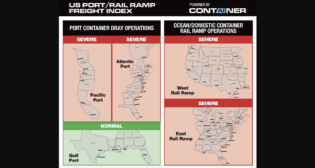
Senate bill would mandate STB reforms
Written by Frank N. Wilner, Capitol Hill Contributing EditorThe “it” is the Surface Transportation Board (STB) Reauthorization Act of 2015, S. 808, introduced jointly by Committee Chairman John Thune (R-S.D.) and the committee’s ranking Democrat, Bill Nelson of Florida. The bill is on a fast-track within the Senate Commerce Committee, with a scheduled March 25 committee mark-up, where it is expected to be cleared for Senate floor action. Thune told Politico he expects the bill to be “married” to a House bill reauthorizing Amtrak (H.R. 749), with the House accepting S. 808 and the Senate accepting H.R. 749. “They haven’t done anything on freight, and our committee has been more interested in the freight issue,” he said.
Thune said S. 808 is aimed at correcting “inefficiencies” within the STB, such as “wasteful and unnecessary delays” in deciding shipper grievances relating to rail rates and service, and that passage into law will “help make the STB a more efficient, effective, and accountable agency.”
In previous years, Thune co-sponsored with his predecessor—now retired Commerce Committee Chairman Jay Rockefeller (D-W.Va.)—legislation with sharper teeth and a deeper bite. Those versions never progressed, owing to railroad opposition buoyed by Senate and House members who stood in opposition, citing concerns that the Rockefeller approach would restore many of the regulatory ills that previously brought railroads to their financial knees and were eliminated by the Staggers Rail Act of 1980, which partially deregulated railroads.
Now in control of the Commerce Committee, Thune is taking a more moderate approach—agreed to by Nelson—that railroads are inclined to accept in hopes of ending three decades of legislative skirmishes with captive shippers and their congressional allies over the role of the STB in regulating freight rates and service.
Here are the main provisions of S. 808:
• To accelerate and make less expensive the process for determining whether freight rates are reasonable for those shippers with few or no effective alternatives to rail, the bill would set deadlines for various steps in the STB decision-making process, and permit less expensive voluntary (by all parties) binding arbitration in cases where railroads are market dominant. The arbitrator would be required to give “due consideration” to the railroads’ need to price differentially so as to be revenue adequate (a rate of return on invested capital equaling or exceeding the current cost of obtaining it).
• The STB would be instructed to study more efficient, simplified, and less costly rate-review methodologies, while the General Accounting Office would be required to study whether railroad “contract proposals”—where a railroad offers all-or-nothing multiple origin-and-destination rates to a shipper (“contract bundling”)—has an adverse impact on the ability of shippers to file rate complaints. (The GAO is chosen because the Staggers Act does not give the STB authority over transportation by contract.)
• To solve problems, such as alleged service failures before they escalate into expensive disputes, the bill would give the STB new authority to initiate an investigation rather than await filing of a shipper complaint. The STB also would be required to maintain a database of shipper complaints and publish them on a quarterly basis.
• To allow more collaborative decision-making, the bill would increase the size of the STB from three Senate confirmed members to five to permit two members (a non-majority) to speak with one another privately about pending cases without holding a public meeting, and so long as the general counsel is present and a summary of the conversation and names of members and staff present are preserved and later made public.
• To give the STB greater administrative independence free of Executive Department (White House) interference, the bill would make the STB an independent regulatory agency, allowing it to submit its budget requests, legislative recommendations, or general congressional testimony directly to Congress rather than first through the Secretary of Transportation. The DOT inspector general would be limited to investigating only matters of financial and property management and business operations of the STB.



